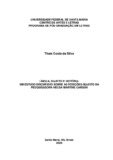| dc.creator | Silva, Thaís Costa da | |
| dc.date.accessioned | 2021-11-16T18:12:27Z | |
| dc.date.available | 2021-11-16T18:12:27Z | |
| dc.date.issued | 2020-02-28 | |
| dc.identifier.uri | http://repositorio.ufsm.br/handle/1/22818 | |
| dc.description.abstract | This dissertation aims to analyze the subject positions assumed by Neusa Martins Carson - linguist from Santa Mariense who had an important contribution to the Linguistics of Indigenous Languages of South America - in articles published in scientific journals, in the 1970s and 1980s, available in the documentary fund that composes the Documentation and Memory Center of UFSM, in Silveira Martins. Our study is justified by the importance of recovering the works developed by that researcher, as they constitute the History of Linguistic Ideas and the history of Linguistics in Southern Brazil, thus contributing to the understanding of the processes of production of linguistic knowledge in the 20th century. We propose an articulation between Discourse Analysis and History of Linguistic Ideas, since it is in this interim that we are theoretically and methodologically constituted; therefore, we mobilized the notions of conditions of production and circulation of knowledge about the Indigenous Language; production and dissemination of knowledge from magazines; language, subject and history; file, personal files; and subject-position. And yet, in the analytical device, we try to establish some discursive cuts that enabled us to perform the gesture of interpretation on the object, in order to reflect on the subject “linguist-researcher”. In our analyzes, based on the production of knowledge promoted by Neusa Martins Carson, it is possible to observe the functioning of his discourse in different materialities, relating a previous historical moment to a later historical moment: the online one. Since we relate the subject positions assumed with the articles published by her, we highlight among these positions: teacher, linguist and activist of the indigenous cause. The linguist was asked to work with the Macuxi Language of Roraima and to invest in what she believed to be important, thus contemplating the processes of knowledge production, in a constant defense of what she believed: in the Indian subject, in her territory, in her language and in your culture. | eng |
| dc.language | por | por |
| dc.publisher | Universidade Federal de Santa Maria | por |
| dc.rights | Attribution-NonCommercial-NoDerivatives 4.0 International | * |
| dc.rights.uri | http://creativecommons.org/licenses/by-nc-nd/4.0/ | * |
| dc.subject | Língua | por |
| dc.subject | História | por |
| dc.subject | Sujeito | por |
| dc.subject | Linguista Neusa Martins Carson | por |
| dc.subject | Language | eng |
| dc.subject | Story | eng |
| dc.subject | Subject | eng |
| dc.subject | Linguist Neusa Martins Carson | eng |
| dc.title | Língua, sujeito e história: um estudo discursivo sobre as posições-sujeito da pesquisadora Neusa Martins Carson | por |
| dc.title.alternative | Language, subject and history: a discursive study on the researcher Neusa Martins Carson | eng |
| dc.type | Dissertação | por |
| dc.description.resumo | Esta Dissertação tem como objetivo analisar as posições-sujeito assumidas por Neusa Martins Carson – linguista santa-mariense que teve uma importante contribuição para a Linguística das Línguas Indígenas da América do Sul – em artigos publicados em revistas científicas, nas décadas de 1970 e 1980, disponíveis no fundo documental que compõe o Centro de Documentação e Memória da UFSM, em Silveira Martins. Nosso estudo justifica-se pela importância de recuperar os trabalhos desenvolvidos pela referida pesquisadora, pois constituem a História das Ideias Linguísticas e a história da Linguística no Sul do Brasil, contribuindo assim para a compreensão dos processos de produção do conhecimento linguístico no século XX. Propomos uma articulação entre Análise de Discurso e História das Ideias Linguísticas, já que é nesse entremeio que nos constituímos teórica e metodologicamente; para tanto, mobilizamos as noções de condições de produção e circulação do saber sobre a Língua Indígena; produção e divulgação do saber a partir de revistas; língua, sujeito e história; arquivo, arquivos pessoais; e posição-sujeito. E, ainda, no dispositivo analítico, procuramos estabelecer alguns recortes discursivos que nos possibilitaram a realização do gesto de interpretação sobre o objeto, a fim de refletirmos sobre o sujeito “linguista-pesquisador”. Em nossas análises, a partir da produção do conhecimento promovida por Neusa Martins Carson, é possível observar o funcionamento do seu discurso em diferentes materialidades, relacionando um momento histórico anterior com um momento histórico posterior: o online. Visto que relacionamos as posições-sujeito assumidas com os artigos por ela publicados, destacamos dentre essas posições: professora, linguista e militante da causa indígena. A linguista foi interpelada a trabalhar com a Língua Macuxi de Roraima e a investir naquilo que acreditava ser importante, contemplando assim, os processos de produção do conhecimento, numa defesa constante daquilo que acreditava: no sujeito índio, no seu território, na sua língua e na sua cultura. | por |
| dc.contributor.advisor1 | Silveira, Verli Fátima Petri da | |
| dc.contributor.advisor1Lattes | http://lattes.cnpq.br/4907455690392249 | por |
| dc.contributor.referee1 | Scherer, Amanda Eloina | |
| dc.contributor.referee2 | Schneiders, Caroline Mallmann | |
| dc.creator.Lattes | http://lattes.cnpq.br/5334960808329521 | por |
| dc.publisher.country | Brasil | por |
| dc.publisher.department | Letras | por |
| dc.publisher.initials | UFSM | por |
| dc.publisher.program | Programa de Pós-Graduação em Letras | por |
| dc.subject.cnpq | CNPQ::LINGUISTICA, LETRAS E ARTES::LETRAS | por |
| dc.publisher.unidade | Centro de Artes e Letras | por |



